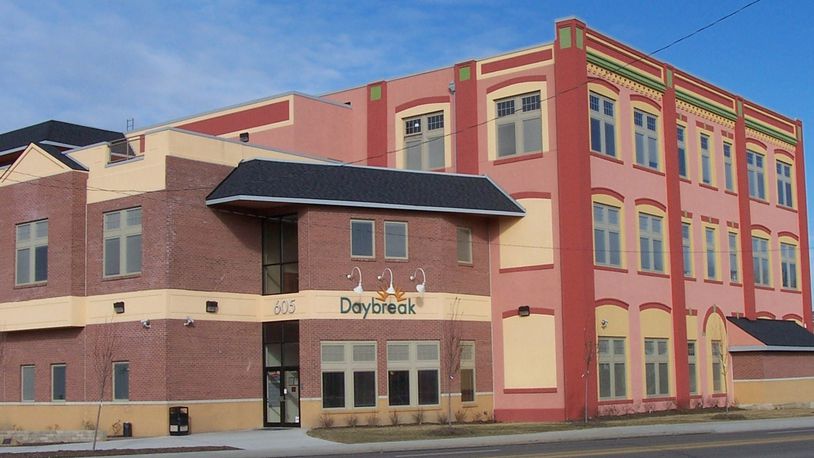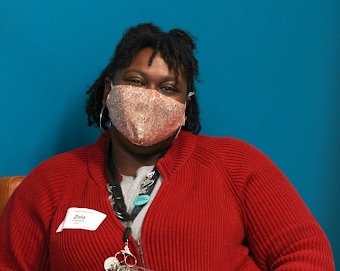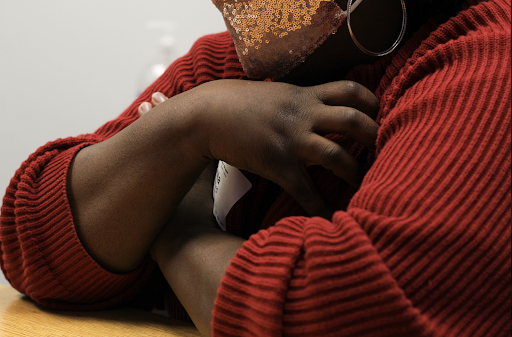Let's Talk Human Rights

Beyond Pride with David’s Place’s Zola Howard
By Josie Forsthoff, Havana Glover
When celebrating pride month, it’s easy to focus on the celebratory aspects. Where will the parades be? Where are some local queer-owned boutiques that I can get an outfit from? Where can I get cute onbrand photos to prove my allyship? While all of these things are important, we suggest you take some time to ask yourself, who is your pride hero? And what do they stand for?
To us, the answer is Zola Howard, LGBTQ Support and Prevention Specialist at DayBreak. Ms. Zola works through David’s Place, a program and safe queer space within DayBreak which serves unhoused youth in Dayton. Ms Zola is the face and heart of acceptance, equity and healing for these queer youth. After taking some youth to Pride last year, she recalled, “one of the youth said, ‘oh my God, Ms. Zola! I didn’t know there were old gay people.’ I’m like, ‘Baby, we have been around for forever!’” She laughed at the thought and added, “seeing that like, spark, it really – it makes my heart warm.”

According to DayBreak, 53% of youth experiencing homelessness identify as LGBTQ+ nationwide. Queer people, especially transgender and gender non-conforming people, still endure instutional and interpersonal violence that renders them more vulnerable to homelessness, suicide, and abuse. The descriptions of trans and gay people as physically threatening, mentally unwell, and a danger to children which permeates mainstream political opinions in many states, including Ohio, materially affect the lives of queer residents. DayBreak reports that 45% or more of LGBTQ+ youth seriously consider suicide and LGBTQ+ unhoused youth are 7.4 times more likely to experience sexual violence. The unhoused queer youth, or as Ms. Zola calls them, “Q+ kids,” are also three to seven times more likely to engage in “survival sex,” increasing their risk of experiencing human trafficking. While sex work is work, sexual exploitation endangers the safety of queer unhoused youth substantially. Critically, these numbers are trending upward and increase exponentially for trans youth of color.
David’s Place at DayBreak and other agencies provide services and spaces to combat these trends and their devastating consequences. Ms. Zola’s drive to assist queer youth comes from lived experience. She explained that, “being a Black queer woman in Dayton growing up, I have been in spaces where I have not felt accepted. With my brother being a trans man, he has been in spaces where he has not been accepted. I just want to put the word out there: there’s actually a place where you can be yourself and you are 100% accepted.” She understands and fights for the unhoused Q+ kids at DayBreak in particular because of her own experience with housing. She shared, “growing up for about three years there we were homeless. I don’t think my view ever changed because of my own lived experience, but I will say it puts more of a fire in me to always be somewhere to assist people, to give back.”
We could feel the warmth of Zola’s fire that welcomes Q+ kids to David’s Place during our interview. It was evident in her laughs and tears even behind a pink sequins mask. Although she takes pride in being an accepting adult in the lives of Q+ kids, she clearly communicated the supportive nature of her role to us. She humbly reiterated, “I am an assistor. I don’t say like, I’m out here trying to help people, because when you help people it’s more like making it easy or doin’ it for them. When you assist, it’s you providing skills with their skills to assist them to move forward.” Her attitude, passion, and patience shone through her presence and responses. She believes “our response is more so [at] the forefront and trying to pave the way for other agencies. These kids need help. We are the response [to youth homelessness].”

A central part of Zola’s work is ensuring that queer youth feel accepted, and the evidence demonstrates the impact of her approach. DayBreak confirms that Q+ kids who have at least one accepting adult were reportedly 40% less likely to attempt suicide in 2021. DayBreak also reports that when they “have a safe shelter, safe social support, and safe adults their risk of trafficking and exploitation decrease substantially.” A community of accepting people who are conscious of the multiple forms of discrimination that youth face based on gender, disability, race, sexuality, and socio-economic status provide a lifeline to the most vulnerable residents of our city. That might be why Ms. Zola says, “when I meet youth [at DayBreak] who are afraid to come out, and they decide to take that step and their family is accepting, it makes my heart full.”
Acceptance, much like the Pride celebrations in June, represents a first step on the path to a larger goal for the queer community. After all, the first Pride parade was “Christopher Street Liberation Day” to honor the one year anniversary of the Stonewall Riots. Queer liberation means safety and freedom beyond designated spaces. Zola Howard and her so-called “gay mafia,” made up of colleagues at David’s Place, Nova, ADAMHS Network, and other co-conspirators fight for “inclusion everywhere.”
“We want all inclusion and equality and equity. If somebody says ‘this is my name,’ believe them and call them by that name. My overall goal and vision, especially for the youth, is that they can come up in a city, a county, a state where their gender and sexual orientation is not questioned; it’s just a part of who they are, and they have the right to be themselves no matter where they go.”
The ultimate goal is to move beyond surviving to thriving, and that is reflected in the services David’s Place provides. These include an LGBTQ+ literature library, individual counseling and support groups, Medicaid enrollment, free contraceptives, intake into DayBreak’s wrap-around and housing services, access to food, laundry, and showers, assistance with purchasing binders and gender-affirming clothing, and other fun and educational activities as a community. Ms. Zola highlighted in particular the LGBTQ+ book club and healthy relationship workshops David’s Place offers as critical services. Healing, affirming, and community building go beyond Pride, acceptance, and survival. They demonstrate how freedom and justice requires more investment in queer lives and futures.
